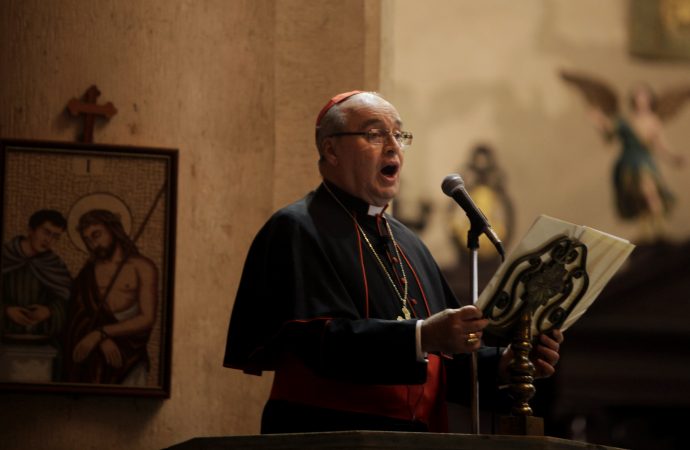When I first arrived in Rome some twenty years ago, one of my first social events was a dinner with a group of Italian journalists from whom I was renting office space. Unfortunately, the conversation had to unfold through an interpreter, because they had no English and to call my Italian “embryonic” at that stage would have been an insult to embryos everywhere.
(Actually, that gang was a great incentive for me to get on top of the language, because just to ask something like “How do I use the photocopier?” in anything other than Italian was an ordeal that I find difficult even now to describe.)
The topic that night, as it turned out, was the favorite Roman parlor game par excellence in those years: Who did we think would be the next pope after John Paul II? While several of us hemmed and hawed, one of the journalists at the table was absolutely clear, immediate and firm in her choice: Cardinal Jaime Ortega y Alamino of Cuba, who served as the Archbishop of Havana from 1981 (three years after John Paul was elected) until 2016 (three years into the reign of Pope Francis).
My journalist friend’s logic was impeccable: John Paul’s fame was partly for standing up to Communism in Europe, while Ortega was known for doing the same thing in the New World. Plus, he was a Latin American at a time when many observers believed the cardinals wanted to elect someone from the Western hemisphere to break the European monopoly on the papacy.
In the end, the advent of a Latin American had to await one more papacy, and even then it wasn’t Ortega. Nonetheless, the memory came back to me when the news broke Friday that Ortega had died from pancreatic cancer at the age of 83.
Born in 1936, Ortega was ordained in 1964, while the Second Vatican Council was still underway and just five years after Fidel Castro had swept to power. Two years later, largely on account of his successful pastoral outreach to Cuban youth, he was imprisoned by the country’s new government, spent a year in a labor camp for what was then called “reeducation”, and eventually was released.
Flash forward a decade, and the promising young Cuban priest was made a bishop under St. Pope Paul VI. He was obviously being groomed for bigger things, and just three years later he was named the Archbishop of Havana, effectively the leader of the Cuban Church, under St. John Paul II.
During his 35-year tenure, Ortega became known around the world for one quality above all: Prudence. He would chide the Castro regime when it threatened religious freedom, but always gently and with discretion. He would also support the regime on certain matters of domestic and foreign policy, but again always with a sufficiently deft touch that he left the difference between a Catholic and an ideological approach to social questions clear.
If nothing else, Ortega will always be remembered for the role he played in restoring diplomatic relations between the United States and Cuba under the Obama administration. In 2014 he opened a channel for dialogue after Presidents Raúl Castro and Barack Obama both secretly turned to him for help. At one stage, Francis asked Ortega to deliver a confidential letter to both presidents, and Ortega made an off-the-books trip to the White House to get the missive to Obama.
Cuba and the U.S. announced the restoration of relations on Dec. 17, 2014, Francis’s 78th birthday.
To be clear, Ortega did not play to universally positive reviews. Among the Cuban exile community in the United States, he was often seen as too soft, too conciliatory, with the regime - he once asserted publicly, for example, that there are no political prisoners in Cuba - and unwilling to speak out with the necessary boldness against violations of human rights and crackdowns on dissent.
During his time, Ortega helped to engineer three papal visits to Cuba: John Paul II in 1998, Benedict XVI in 2012 and Francis in 2015. The first of those visits provided him with an education in the ways of the American press, since in the run-up to the trip it was set to be the global news story of the year. All the A-list American talent of the time, such as Tom Brokaw and Peter Jennings, were on hand to cover the anti-Communist Polish pope’s collision with the Castro regime, and then at the last minute they all flew home because an even bigger story by American standards was brewing: The Monica Lewinsky scandal.
Through it all, Ortega tried to guide his church with caution and resolve. Critics on the American side often faulted him for an excess of caution, while his Cuban counterparts sometimes resented his resolve.
Whatever one makes of Jaime Ortega in the long run of history, what has to be said now is that he handled one of the Catholic Church’s most difficult jobs for 35 long years without public complaint and with consistent dignity, slowly opening more space for the faith to live and breathe under a regime that’s officially atheist and not exactly religion’s best friend.
Ortega never became pope, but he was nevertheless one of the most remarkable churchmen of his time, so it’s appropriate to say today, on behalf of Catholics everywhere: Requiescat in pace.

